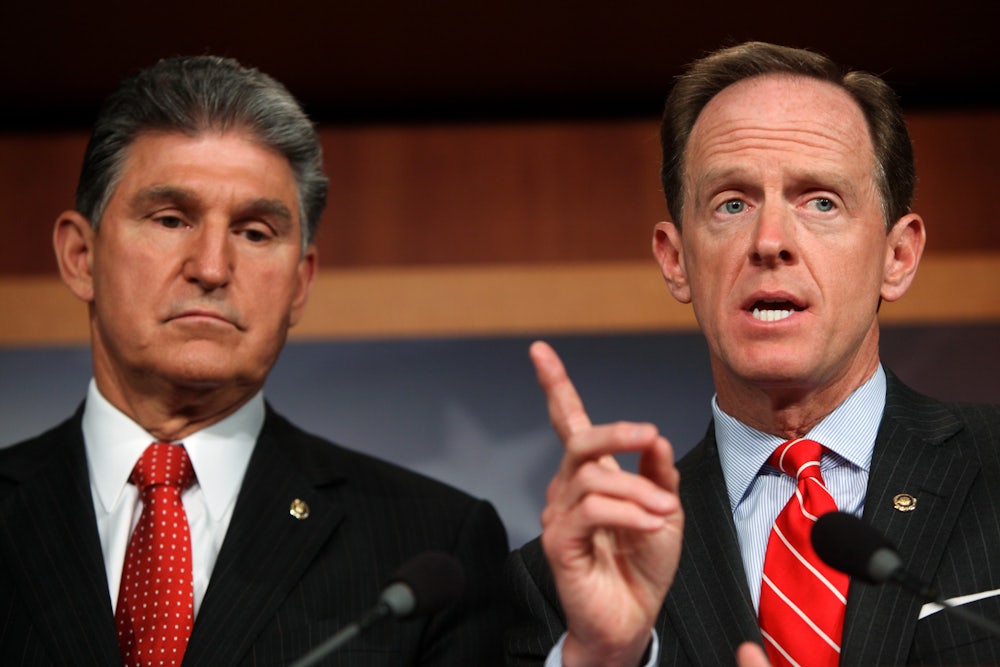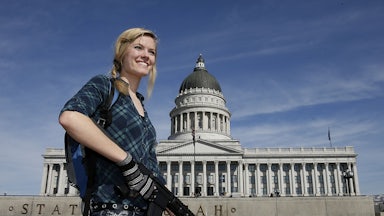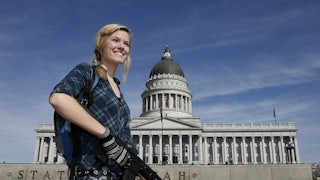Some senators are tentatively opening conversations on some kind of gun control legislation in the wake of a horrific mass shooting in an elementary school in Texas that left 21 dead, including 19 children. But with the chamber set to leave town on Thursday and a long and storied history of failure to enact such legislation, even in the wake of heartbreaking tragedy, it’s far from certain that anything actually can or will get done.
At the moment, the Senate is the crucible in which any gun control legislation may be forged, as the House of Representatives is in recess and its members are out of town through the beginning of June. But this would be just as true if the House was in session: Any gun-related legislation would need to garner 60 votes to advance in the Senate because of the filibuster, meaning that at least 10 Republicans would need to be on board. But history has shown that no matter how high the death toll or how vulnerable the victims, whenever the Senate is faced with unspeakable tragedy caused by gun violence, these obstacles have proven to be insurmountable.
“We’re going to do everything we can to get, I hope, a bill to the floor as quickly as possible. But you know what’s going to happen. It’s going to fail,” Senator Cory Booker told reporters on Wednesday. “We are caught in the most perverse version of Groundhog Day.”
Previous efforts to craft gun control legislation have foundered in the upper chamber, with a bipartisan background checks bill negotiated by Democratic Senator Joe Manchin and Republican Senator Pat Toomey failing to break a filibuster in 2013. (Senators were engaged in bipartisan talks over red flag laws in the summer of 2019, but those ended with the beginning of impeachment proceedings against then-President Donald Trump.)
Senators began reopening bipartisan discussions after the horrific shooting in Texas, with Democratic Senator Chris Murphy making overtures to Toomey and Republican Senator Susan Collins. Senate Majority Leader Chuck Schumer gave his blessing to these discussions, although he warned on Wednesday that success may be a “slim prospect.” Schumer also promised that the Senate would vote on gun legislation at some point. (The Senate is set to vote on a domestic terrorism bill that the House passed last week in response to the mass shooting in Buffalo, New York, but it is unlikely to garner sufficient Republican support to advance.)
“I understand the prospects for getting the 60 votes are slim; they’re always slim. But there’s a nonzero chance that we could get a compromise, and I began to talk to some of my Republican colleagues about some ideas,” Murphy told reporters on Wednesday. Murphy also said that he hoped to speak with Republicans while the Senate is in recess next week with the goal of finding common ground.
“It’s fucking nuts to not do anything about this,” Democratic Senator Mark Kelly told reporters. Manchin told ABC News on Wednesday that a bipartisan group of senators would gather this evening to talk about potential gun control legislation.
But Republicans offered mixed perspectives on how best to approach the crisis of gun violence. Collins told reporters that her focus would be on “what some states have done on red flag or yellow flag laws,” referring to laws that allow for “extreme risk protection orders” to temporarily confiscate firearms from people exhibiting potential signs of violent behavior. (Although New York has a red flag law, state police had not previously sought an extreme risk protection order for the shooter in Buffalo.)
“I’m generally inclined to think some kind of red flag law is a good idea. Whether we could enact that at a federal level, I don’t know,” said Senator Roy Blunt. Republican Senator Rick Scott also seemed open to legislation on red flag laws, telling reporters that such a bill might be able to get Republican support “as long as you go through due process.” (Scott signed a red flag law as governor of Florida in 2018.)
GOP Senator Lindsey Graham, who had previously worked with Democratic Senator Richard Blumenthal on legislation to incentivize states to adopt red flag laws, raised that idea as something that could gain traction with his Republican colleagues. “There’s conversations going on, and maybe something will come out of it,” Graham said. “You just sort of chip away at this kind of stuff.” Blumenthal told reporters that he and Graham would continue working on the red flag bill and would be “reviewing it with our staff and maybe a couple of colleagues who are interested in it.” Senator Marco Rubio, who sponsored a separate bill to incentivize states to adopt red flag laws, also expressed support for reopening conversations on such a bill.
However, there was far from universal support among GOP senators on the topic. “I just think it’s so complicated, that it’s hard for me to envision how that would solve the problem we’re trying to solve,” Senator Cynthia Lummis said about red flag laws.
Other Republican senators appeared open to discussing some sort of legislation on background checks. “I think the thing that would have the best chance would be the thing that has gotten Republican support before, which is expanding background checks,” Toomey said.
But other Republicans argued that actually, the real problem was mental health. “Guns are not the problem, OK? People are the problem,” Senator Tommy Tuberville said. “We’ve had guns forever. We’re going to continue to have guns.” Tuberville also asserted that “we’ve had automatic weapons forever.” (We have not.)
Senator Kevin Cramer told reporters that “the weapon of choice is less the issue than the person that pulls the trigger.” Cramer said, “I do think mental health is the area that is ripe for discovery and ripe for exploration.” When asked how Congress could address gun violence, another Republican, Senator Dan Sullivan, said: “Issues of mental health right now are front and center.”
Some Republicans appeared to close the door on supporting any measure limiting access to guns. When asked how his state of North Dakota would react if he supported gun control legislation, Cramer replied: “They would probably throw me out of office.”
“I’m not going to support anything that’s going to take away the constitutional rights of citizens of my state or any state,” Senator John Barrasso told reporters. (Senator Ron Johnson told one reporter he was “sick” and “ought to be ashamed” for asking a question on firearms.)
“We’ve got a constitutional right to bear arms. The Second Amendment. I support that and always will,” Senator Richard Shelby told reporters.
Other Republicans adopted a defeatist tone. “What new legislation could you possibly do that would have stopped this that he would have listened to, or that would have stopped him?” asked Senator Mike Rounds. “We already make it illegal to have guns in schools. We already made the atrocity itself—murder—illegal.”
“I can’t assure the American people there’s any law we can pass that would have stopped this shooting,” Graham told ABC News.
“We’ve had background checks for decades. Trouble is, it doesn’t always work. So what do you do if it doesn’t work?” Senator Chuck Grassley pondered.
Some Democrats expressed frustration with their colleagues and pessimism that anything could be done. Senator Jon Tester told reporters that conversations about anything other than background checks were “silly,” because “it ain’t gonna pass.”
Booker told reporters he did not believe “there are 10 Republicans that are doing the things that will make us safer.”
“In the conversations I’ve had with colleagues, they are disturbed, upset, troubled, but not willing to change where they are legislatively. This is a bad day. This is a bad day for anything even vaguely looking like hope or optimism around legislative progress,” Senator Chris Coons told reporters. “Usually I want to be more optimistic, but I don’t think it will change anything.”










